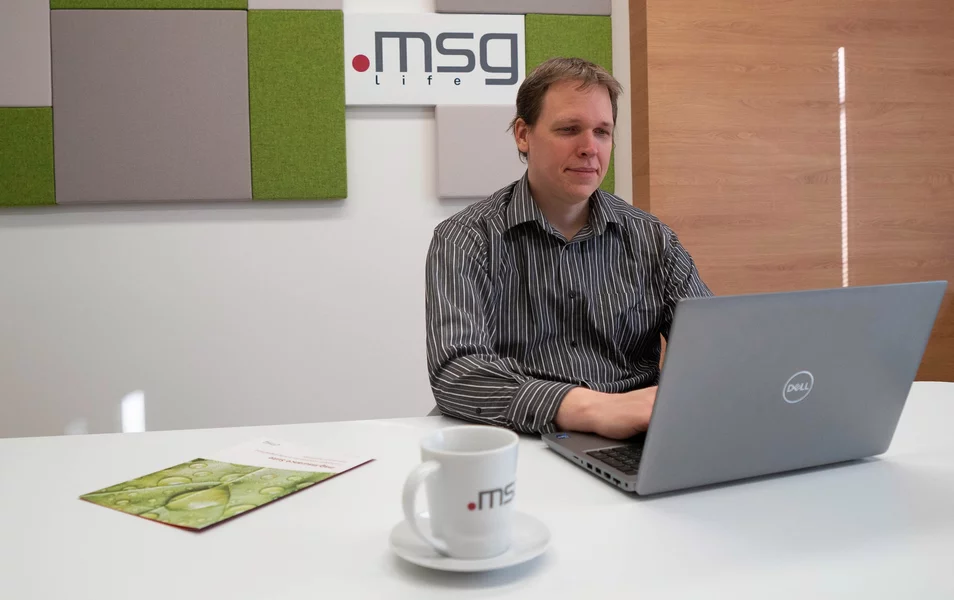
Java programmer expert
What does the work of a Java developer at msg life Slovakia look like? Our long-time colleague and smart Java developer Jozef told us about his agenda, how his work has changed after the covid crisis and added some tips for developers looking for a job.

V článku sa dozvieš:
Hi, Jozko. Let’s start a little unconventionally. Before you tell us what you normally do during the day, tell us something else: how has the covid pandemic changed your work and how has it affected your attendance?
In fact, this also applies to the normal working day. It has changed with the coronary crisis, because before we used to go to work every day, then we switched to home office. The company was sceptical at first because of productivity, but there was nothing we could do about government regulations.
Concerns about productivity disappeared immediately, the opposite was true. I know there are conflicting opinions on this, but our home office has shown higher productivity. Time was saved on travel, distractions were minimised and communication was more efficient with MS Teams. The company was impressed and the employees appreciated it, creating a win-win situation. (See also Home Office – Tips for Efficiency).
Once the lockdown was over and the measures were relaxed, it was a springboard for further changes. The company gave us a choice between a fixed desk and a flexi workstation. As a Java developer, I chose the fixed desk.
What are fixed desks and hot desks?
It’s basically a hybrid attendance model. It also came about because we have a family culture and we like to get together, but a lot of us have families, we have to look after the kids. Another reason the company uses it is for growth.
As the company is expanding and capacity is running out, the hybrid model has given us more space. We have flexible desks, several people are assigned to them and they rotate as needed and as agreed. They come into the office twice a week, so they can manage a schedule of who comes in and when. And then we have fixed desks that are reserved for people who come in at least three times a week.
Home office is often a prerequisite for new applicants when choosing a job. Does the software developer job in a company like msg life Slovakia have a seamless transition to a hybrid model and home office, or does it require some technical preparation?
Working from home is almost identical to working in the office because we use the same technology. If I have a home office, I can sleep half an hour longer, otherwise I would spend that half an hour travelling. And of course there is a difference in terms of socializing, but technically the transition is seamless.
What does a typical day look like for a Java developer?
It starts with looking at the messages on Teams and emails. We are in various working groups. We often organize meetings, so at the beginning of the day we have to allocate time for leadership and meeting time, depending on whether attendance is mandatory or optional. Meetings also depend on how the project is being worked on, whether it’s agile with Scrum or something else. If you use Scrum, there are more meetings, of course.
Our company deals with life insurance and offers customized software to customers. We have a standard, a common set of product features that is the same for all customers. And then we have customization for specific customer problems. And that’s my job too – to customize software for specific needs.
The customer request is analyzed, issues are created in Jira, and a plan is made on how to proceed. If we have 3-week sprints between releases, a certain amount of work is scheduled. We then choose the tasks in the team. We are divided into several categories, some working on the GUI, others on on insurance models.
What is your specialism in this process and what tools do you use?
I specialize in the business logic behind life insurance. We code in Java, use Jira by default for issue management, Maven for environment building and Jenkins for package integration. For database systems, we use DB2 or Oracle.

For junior candidates, a developer salary is probably the biggest draw. Expectations are high, but the position probably requires some experience. What do you think would be a good fit for the department?
The ideal candidate for the Java position is an experienced developer, preferably with some knowledge of German, although your German doesn’t need to be at such a high level. English is more or less sufficient, but there are German courses and it’s expected that you can communicate in German to a certain extent.
That’s mainly because we work on projects with German colleagues, and not every team is English-speaking. If the whole team had to adapt to one colleague, it wouldn’t make sense. This is one of the reasons to learn German.
Those experiences are, of course, different for a Java developer senior and different for a junior Java developer. During the initial interview, you need to have certain theoretical knowledge on both fronts. I would recommend reviewing the main object-oriented principles. Every Java programmer takes an initial test with a colleague who specializes in that area. It’s not a difficult test; it’s designed more to reveal the thought process of the candidate.
When you came to msg life Slovakia, did you already have experience with programming?
Yes, I did. I started in a company where we developed human resource management software, initially in C++. When we started to integrate new functionalities into the HR system, we switched to Java, which was my first experience with this language. In another company we were building a portfolio management system in C#, it was actually a system for managing traded positions on the stock exchange. It all fitted together and gave me a broad view of languages, so a very good school.
When I finished there, I was looking for a smaller company with a family atmosphere. I don’t like open-plan offices, I prefer smaller offices where I don’t have to block the noise with headphones. My sister was working at msg at the time and told me about a vacancy. When I first contacted them, I was immediately impressed by how open they were. That was about 8 years ago and I’ve been here ever since, so I guess they’re doing well and so am I.
You have experience in the corporate world of developers. What impresses you most about msg life Slovakia?
I like the fact that we can influence the content of our work and are appreciated for it. For example, we have six-monthly reviews, for which we set some goals, and we get bonuses if we achieve them. The goal could be a certificate in English or an analysis of the working environment – that’s what I did. I did a hardware analysis for our IT department, showing the potential for increased performance and cost savings.
I also feel that msg’s approach to employee benefits is very different from that of other companies. They’re not just some item on an employer’s subpage, they really work! A few examples. The most recent is from the beginning of the pandemic. During the closure, the offices began to change: equipment, furniture, improvement of the environment. Apart from the fact that we work better now, we have better chairs and desks, I also like the efficiency – the company has used the lockdown situation to improve the working environment.
We have table football, a gym, massage facilities, health talks, spinal checks. These are great things. As developers, we spend a lot of time sitting, and our backs often bear the brunt of that.
Table football is another social activity we have here. When I first joined the company and didn’t know anyone, it was thanks to table football that I got to know a lot of colleagues. I used to walk around the office looking for people to play with. If I didn’t find anyone in one department, I’d try another. That’s how, over the weeks, several of us took turns at the table and gradually got to know each other.
So you also know colleagues from other departments?
At the beginning, we had 5 floors, and people were more or less isolated from each other. We have development teams, testers on different floors, managers on others. The company came up with a great solution to break down these walls and floors metaphorically. They started organizing joint lunch meetings. When the weather is nice, we usually go out for a big group lunch.
Through these events, people started to get to know each other, to “integrate.” And also, thanks to that, when someone encountered a problem, they already knew who to turn to. They knew a colleague from another department by name, or at least had an idea of where they sit. Another effective solution, in my view.
What advice would you give to potential candidates?
Luck is not enough, you also need to know something. But you don’t have to stress about it, the potential is evaluated. It’s important to remain human. One of the reasons why msg life Slovakia is so good is that they look at character and how a person fits into the team. A minimum of conflicts, a good team atmosphere – this is also reflected in the work.
On the following page you can find our job offers.
Related articles